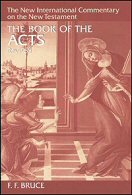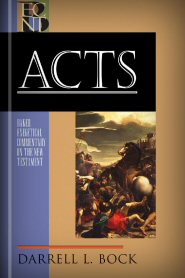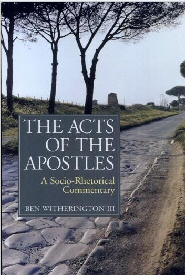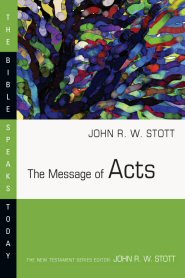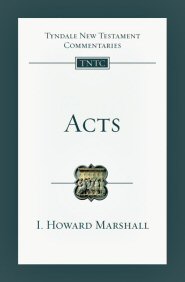Best Resources on Acts
"The book of Acts (also called Acts of the Apostles) begins where the Gospel of Luke left off. Before ascending into heaven, Jesus commissions His disciples to be His witnesses from Jerusalem to the end of the Earth (Acts 1:8). In fulfillment of this command, and through the power of the Holy Spirit, the early church expands. Acts shows what it means to be part of Jesus’ mission to the world. The apostles set the example of what it means to be fully devoted to Christ and enveloped by the Holy Spirit.
According to early church tradition, the author of Acts is Luke the physician, who traveled with the Apostle Paul (Col 4:14; 2 Tim 4:11; Phlm 24). The Gospel of Luke is also ascribed to him; this makes Acts his second volume about the story of early Christianity (Acts 1:1; see the “Introduction to Luke”). Four passages in Acts seem to indicate that the narrator is a firsthand witness of particular events he describes (Acts 16:10–17; 20:5–15; 21:1–18; 27:1–28:16)—which is fitting with Luke being the author.
Like the Gospel of Luke, the book of Acts is addressed to Theophilus, who might have provided financial support for Luke to write both books (Luke 1:3; Acts 1:1). Luke’s broader audience appears to have been people who were already Christians, or at least were interested in Christianity (Luke 1:4). Since the narrative of Acts ends with Paul’s captivity in Rome, it might have been written shortly after his arrival there, in the early to mid-60s AD. Another possibility is that Paul preaching the gospel in Rome provided a natural stopping point for the book because it showed that the church was fulfilling Jesus’ command to be His witnesses to the ends of the earth—Jerusalem and Rome were on opposite sides of the empire (Acts 1:8). In this case, Acts could have been written later in the first century AD."
—Faithlife Study Bible, Lexham Press
Everything You Need to Study & Teach Acts
Expository Preaching Kits are curated resources all focused on helping you teach a single book of the Bible—keeping you prepared without weighing you down.
Best Commentaries on Acts
F. F. Bruce, New International Commentary on the New Testament (NICNT), Eerdmans, 1988, 564 pp.
Expanded and fully updated, this volume now reflects the best elements of recent notable contributions to the study of Luke-Acts as well as the author’s own deepened understanding gained from years of further reflection on the text. Whereas the first edition used the text of the American Standard Version of 1901, this revision is based on Bruce’s own fresh translation of the Greek text. The result is a work that makes transparent the walls between the first and the twentieth centuries and enables readers to hear not only the voice of Luke but also the Word of God.
- Level: Intermediate
- Type: Expository
Darrell L. Bock, Baker Exegetical Commentary on the New Testament (BECNT), Baker, 2007, 880 pp.
Darrell Bock provides a thoroughly evangelical commentary on Acts in this volume. With extensive and current research from major works written in the last 15 years and thoughtful chapter-by-chapter exegesis, Bock covers all aspects of the book of Acts—sociological, historical, and theological—for a deeper understanding of Acts. He also seeks to make his commentary readable and concise for those that are not knowledgeable in Greek.
- Level: Advanced
- Type: Expository
Ben Witherington III, Socio-Rhetorical Commentary Series, 1998, 903 pp.
This commentary on Acts is written in a readable style, drawing on the best new insights from a number of disciplines (narrative, archaeology, social scientific study, rhetorical analysis, and comparative studies) to provide the reader with the benefits of recent innovative ways of analyzing the text. In addition, Witherington provides detailed attention to major theological and historical issues: the question of the relationship of Acts to the Pauline letters; the question of early Christian history and how the Church grew and developed; the relationship or tension between first-century Judaism and early Christianity; and the relationship between Christianity and the officials of the Roman Empire.
- Level: Intermediate
- Type: Expository
John Stott, Bible Speaks Today (BST), InterVarsity Press, 1990, 428 pp.
The Spirit moves the Church into the world. That is how it has always been since the day of Pentecost when the Spirit brought thousands from many countries into the body of Christ. With the breadth and scholarly care that have marked John Stott's years of ministry, this book opens to us the early days of the Church as recorded by Luke in the book of Acts.
- Level: Basic
- Type: Devotional
I. Howard Marshall, Tyndale New Testament Commentaries (TNTC), InterVarsity Press, 1980, 447 pp.
In the book of Acts, the story of Jesus begun in the Gospel of Luke broadens into the story of the Holy Spirit, guiding the fledgling Church to proclaim the saving reality of Jesus. While attentive to Luke's roles as a literary artist and theologian, I. Howard Marshall focuses primarily on Luke's role as a historian. He provides the reader with an accurate, balanced, and holistic picture of the Church's monumental first years as it sought to fulfil Christ's mandate to preach the gospel to the ends of the earth.
- Level: Basic
- Type: Devotional
Best Books on Acts
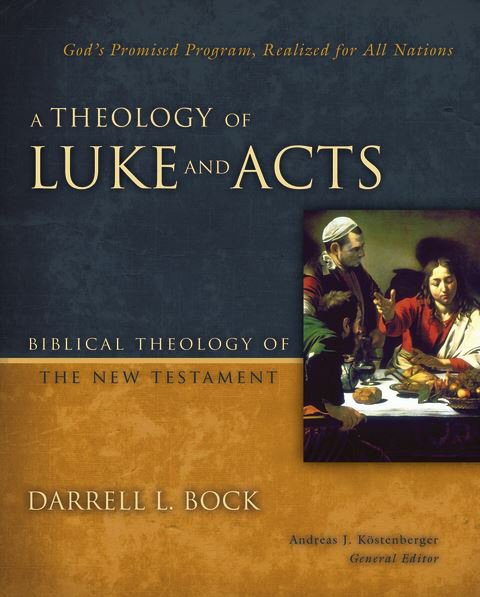
A Theology of Luke and Acts: Biblical Theology of the New Testament
Darrell L. Bock draws from his years of experience in biblical studies to examine Luke and Acts and write an informative resource that’s invaluable to those seeking holistic biblical understanding. A Theology of Luke and Acts identifies and evaluates the contribution of Luke, both to the New Testament and to the Bible as a whole. Bock aims to demonstrate Luke’s significance and influence in the development of theological discourse. The text discusses Luke’s themes and thematic relevance, the significance of language and vocabulary, and the contextual importance of Luke’s placement in the Bible. Continuing the valuable tradition of the Biblical Theology of the New Testament Series, Bock’s insights regarding Luke and Acts will prove a lasting resource for pastors and aspiring biblical scholars alike.
Learn more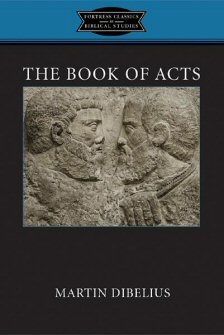
The Book of Acts: Form, Style, and Theology
This volume brings together some of Martin Dibelius’ most important work. While he is especially renowned for his commentaries, Dibelius was on the forefront of literary analysis, the relationship of theology to literary artistry, and the importance of contemporary Greco-Roman history for the analysis of the book of Acts. As an aid to students, each essay has been supplemented with additional notes and bibliography to show where the discussion has continued since Dibelius. This will provide an excellent supplementary textbook for courses on the New Testament or the Bible.
Learn more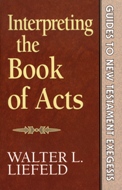
Interpreting the Book of Acts
Interpreting the Book of Acts presents the fruit of the author’s thirty-year reflection on the Lukan corpus. With a sure hand, he guides the reader through numerous approaches to the text. Literary purpose and structure, narrative theology, discourse analysis, cultural backgrounds—all are exploited for insight. Yet throughout, the author keeps in view the practical needs of the student and pastor, breathing a spiritual warmth into the applications he makes.
Learn more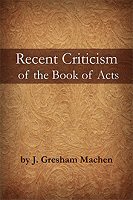
Recent Criticism of the Book of Acts
J. Gresham Machen is considered the last in the lineage of the Great Princeton Theologians, following in the steps of Archibald Alexander, Charles Hodge, A. A. Hodge, and B. B. Warfield. Machen taught at Princeton Seminary for almost 15 years and established himself as a well respected New Testament scholar. After a dispute that divided faculty members over an emerging modernist theology, Machen left Princeton and became one of the principal founders of Westminster Theological Seminary, where he taught until his death. This essay on the authorship and literary unity of Acts originally appeared in the Princeton Theological Review.
Learn more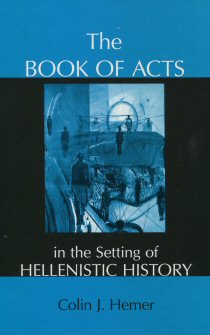
The Book of Acts in the Setting of Hellenistic History
Of the New Testament books, Acts contains the most obvious ties to its cultural and historical context. But until recently, most twentieth-century authors have bypassed discussion of the relation of Acts to the world and history around it. In this book, Colin Hemer examines various strands of interlocking historical data—ranging from the Epistles of Paul to records of the corn fleet that sailed from Alexandria. The wealth of new literary, epigraphic, and papyrological data brings fresh light to numerous details as well as to the central question of Luke’s conception of Paul’s visit to Jerusalem. The result is a broader understanding of the Hellenistic world in general and a greater appreciation for Acts as a coherent and consistent product of its day.
Learn moreBest Courses on Acts
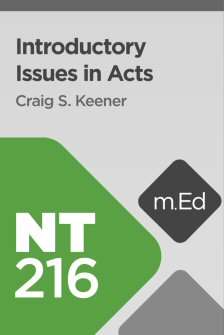
Mobile Ed: NT216 Introductory Issues in Acts (2 hour course)
Dr. Craig S. Keener, award-winning scholar and author of one of the largest and most thoroughly documented Acts commentaries available, provides students with an introduction to the book of Acts that focuses on such fundamentals as genre and historical context. He also explores key themes including mission, ethnic reconciliation, and evangelism, and discusses the Spirit’s power to bring these about.
Learn more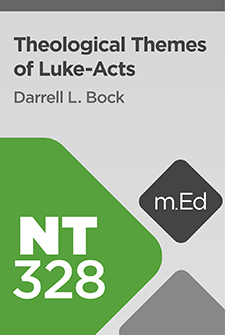
Mobile Ed: NT328 Theological Themes of Luke-Acts (3 hour course)
In NT328, Dr. Darrell L. Bock will walk you through 10 theological themes of the unified work Luke-Acts. You will learn what Luke-Acts has to say about salvation, the kingdom, Christians in society, the future of Israel, and so much more. By the end of this course, you will be well acquainted with major themes woven throughout the biggest literary work in the New Testament.
Learn more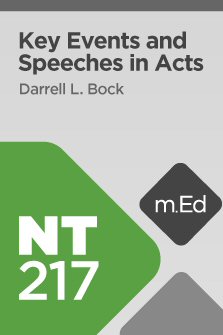
Mobile Ed: NT217 Key Events and Speeches in Acts (4 hour course)
Explore the book of Acts in depth with Dr. Darrell L. Bock who is internationally recognized for his scholarship in Luke-Acts. You will hear Dr. Bock’s commentary on key speeches and significant events such as Pentecost, the expansion of the gospel to the gentiles, and the Jerusalem council that decided how Jews and gentiles would function as one body. You will learn how Luke’s writings are the “glue” that coheres the New Testament and how these works explain the way the Old Testament fits into the New.
Learn more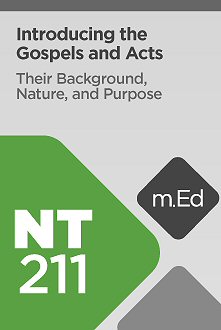
Mobile Ed: NT211 Introducing the Gospels and Acts: Their Background, Nature, and Purpose (6 hour course)
Study the key events of the Gospels and the book of Acts with prolific New Testament scholar Dr. Darrell L. Bock. Dr. Bock walks you through the pivotal events of history that shaped the social, religious, and political environment of Jesus and the early Church. Find out why the religious leaders wanted Jesus crucified and how the resurrection demonstrated God’s approval of Jesus as Messiah. Discover how the early Church remembered, shared, and recorded the events of Jesus’ life and how those events became the catalyst for ministry in the book of Acts. Learn about the literary features of the gospel genre and why some “gospels” were not included in the New Testament.
Learn more